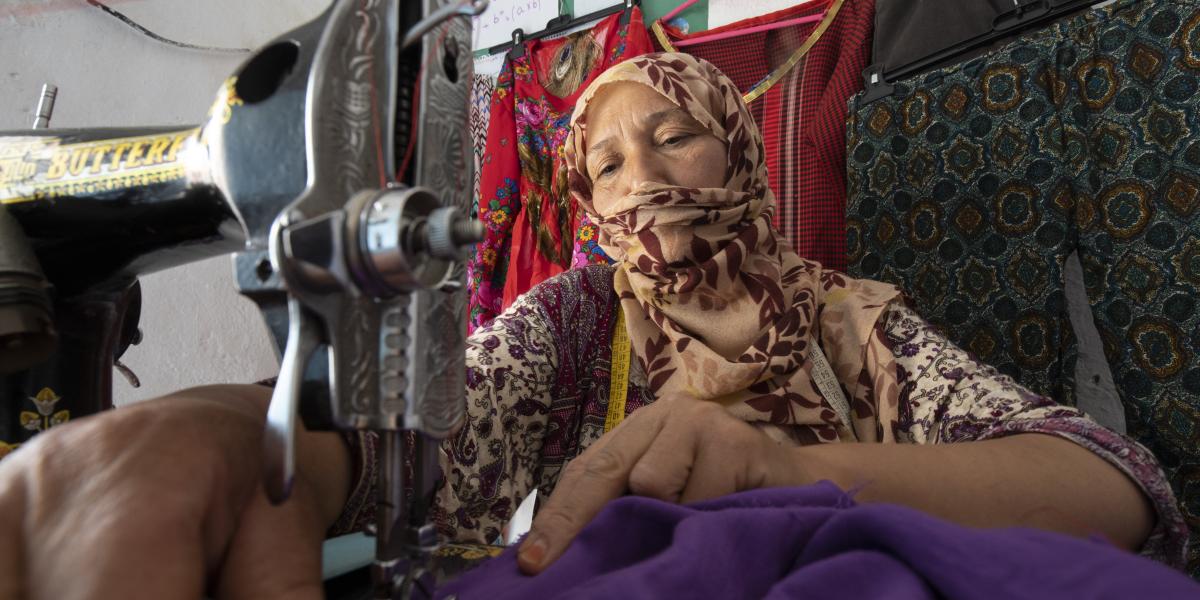Selma Votes
Empowering rural Tunisian women to participate in elections
Story by Nic Corbett | Photos and video by Nessim Stevenson and Sebastian Lindstrom for USAID
February 2020

Selma Sbissi walks through the desert with her donkey each morning, filling empty containers with well water to haul home.
Selma, 48, lives in southern Tunisia, in a rural village outside Tataouine, with her husband, mother-in-law, and three children. Her municipality doesn’t provide water service to her home; she wants that to change.
Around her neck is a small water cooler bearing the image of a woman pointing to an ID card and Arabic script that says: “Register to vote.”




Revolution
Tunisia is where the Arab Spring began in 2011. Citizens overthrew their autocratic leader and established a democracy. Now decentralizing power to the local level, Tunisia held its first free municipal elections in 2018.
“After the revolution, many things have changed,” Selma says. “When you go to vote, no one will tell you whom to vote for, or bribe you in exchange.”


A Political Awakening
A turning point for Selma was when she met Awatef, a civic education ambassador supported by USAID.
“Before Awatef showed up at my door, I decided not to vote anymore,” Selma says. “We have no jobs, no water. And I thought that every time we vote, there weren’t any tangible results.”
Awatef, 27, was among nearly 200 female volunteers trained to help women with low literacy levels to register to vote. The civic education ambassadors were deployed to remote and hard-to-access areas across the country to reach the women and explain voting procedures.
Selma says: “Awatef encouraged us to participate in democracy and to embrace freedom.”


Women like Selma face many barriers to civic and political participation. According to the National Institute of Statistics, 65 percent of women in rural Tunisia drop out of school at an early age, contributing to an illiteracy rate of over 30 percent.
Although she took a literacy course some years back, Selma still struggles to read and write. But she doesn’t let it hold her back.
For Selma and others, voting has inspired civic activism.
Selma, who learned to sew from watching YouTube tutorials, became head of a local union of women tailors and weavers. She wants to combat the high unemployment rate among young women and men in her community.



Paying it forward
“I have a lot of energy inside me, and I want to use it to convince other women,” Selma says, “and tell them that we have freedom of expression and the right to vote. Those whom we will vote for will create job opportunities for our children.”

“I will teach my children to vote, so that they have a better future,” Selma says.
About This Story
In partnership with the International Foundation for Electoral Systems (IFES), Tunisian Mediterranean Center (Tu-Med), and Canadian Government, USAID trained and deployed female civic ambassadors to areas with the highest illiteracy rates to encourage women to register and vote in the May 6, 2018 municipal elections.
USAID reached over 7,000 rural women during voter registration and 27,000 rural women during the mobilization. Nearly 70 percent of the women reached reported they voted, far exceeding the national average of 35 percent.
More than one-fourth of the women who participated in the elections said they voted against candidates who wanted to buy their vote or to sanction those whom they do not trust. These results demonstrate an understanding of their rights and responsibilities as voters.
USAID continued to work with civic ambassadors in the run-up to the 2019 presidential and parliamentary elections. Many of the women reached as part of the project are now civic education ambassadors themselves.
